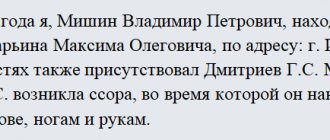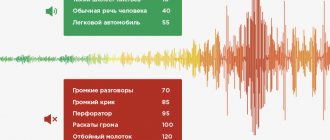A resolution to initiate a criminal case is a procedural document adopted based on the results of a preliminary inquiry in the event that the investigative body sees the elements of a criminal offense in the act under investigation, as stated in Article 140 of the Code of Criminal Procedure of the Russian Federation. Files in .DOC: Form of resolution to initiate a criminal caseSample resolution to initiate a criminal case
Grounds for initiating criminal proceedings
The only basis for initiating a criminal case is the existence, even formal, of a crime.
It does not matter whether the investigation has a suspect or has yet to be identified. Let us repeat once again - a criminal case is initiated based on the fact, and not against a specific culprit. Involvement as a suspect or accused are separate procedural actions.
The classification of the crime does not matter, because it can later be adjusted.
As a rule, investigators initiate a criminal case under a more serious article, since the transition to a “softer” article does not require the issuance of additional decisions on reclassification.
For example, if a corpse is discovered with signs of violent death, a criminal case will be opened for premeditated murder. If during the investigation it is established that the person was not killed, but was pushed, as a result of which he fell, hit his temple and died, the qualification will be changed.
Sometimes you can come across publications whose authors claim that the grounds for initiating a criminal case are statements, complaints, confessions, etc. This is wrong.
Art. 140 of the Code of Criminal Procedure of the Russian Federation calls statements, complaints, reports and appearances reasons for initiating a criminal case, but not grounds. But the same article calls grounds for initiation only the establishment of signs of a crime, that is, its fact.
Stages of investigation
The primary element of the investigation (Article 144 of the Code of Criminal Procedure of the Russian Federation) is a preliminary inquiry, for which the investigative body is allotted from 3 to 10 days. If additional measures are required to determine the presence of a crime, the period may be extended to 30 days.
Such activities may include, among others, conducting examinations. For example, when a corpse is discovered, it is impossible to establish the cause of death without the special knowledge of forensic experts.
In order to find out whether the death was of a violent nature, an examination is ordered. Based on the results of the examination, an appropriate decision is made - either to initiate a criminal case or to refuse to initiate a criminal case (Article 145 of the Code of Criminal Procedure of the Russian Federation).
The second stage of the investigation is the initiation of a criminal case. As a rule, a criminal case is initially initiated based on the fact of the crime, that is, without involving the accused. At this stage, the person who committed the crime is usually either not identified or is a suspect rather than an accused.
Sometimes the initiation of a criminal case can be carried out simultaneously with the third stage, that is, with the issuance of a resolution to charge a person as an accused. This usually occurs if a person surrenders or if a person is detained at the scene of a crime in circumstances that directly indicate his involvement in a criminal act.
That is, the decision to initiate a criminal case is actually the beginning of a real investigation, during which the investigative authorities carry out the entire range of investigative actions from the stage of inquiry to the stage of sending the case to court.
The fourth stage will be the adoption of a decision to bring charges, followed by:
- bringing charges;
- drawing up an indictment;
- approval of the indictment;
- familiarization of the accused with the case materials;
- referral of the case to the court.
At all stages, starting with the initiation of a criminal case, the participation of a lawyer is mandatory.
Structure of the resolution
The content of the resolution to initiate a criminal case is regulated by Art. 146 of the Code of Criminal Procedure of the Russian Federation and deviation from the established rules is tantamount to declaring the resolution illegal.
In general, the resolution should include the following structural components:
- the date of the decision, indicating the time it was made and the locality in which it was made;
- Full name of the investigator and name of the investigative body within which he operates;
- the reason and basis for initiating the case. Let us recall that the cause is the event through which law enforcement agencies learned about the crime, and the basis is the existence of the fact of the crime;
- qualification of the crime;
- signature of the person who made the decision.
Expert opinion
Mikhailov Igor Konstantinovich
Legal consultant with 10 years of experience. Specializes in the field of civil law. Has experience in document examination.
If it is established that the initiated case is not within the jurisdiction of the body that issued the decision, a note is made in the text about sending the case materials to the prosecutor for further sending the case to the jurisdiction.
The investigator personally takes the case materials along with the decision to the prosecutor for approval. If the prosecutor does not agree with the decision made, he must make his own decision to cancel within 24 hours, after which he returns the materials to the investigator.
As a rule, prosecutors do not overturn decisions. If they detect violations of the law or misclassification, they give the investigator appropriate verbal instructions. Following the instructions of the prosecutor, the investigator subsequently either changes the qualifications or makes a decision to terminate the criminal case.
| Wait: | 19 | sec |
Document file name: postanovlenie_o_vozbuzhdenii_ugolovnogo_dela
Available download format: doc
Text file size: 25.0 kb
Design features
The form of the application is not specified by law. However, any type of document is compiled more or less the same way. It must contain the following mandatory details:
- Title of the document (“Application for...”).
- Date of preparation.
- Registration number.
- Information about the recipient: name, address, etc.
- Information about the applicant: full name, address, position, telephone.
The application must also meet the general requirements:
- The text can be composed either by hand or using a PC.
- If this is a written application, there must be a handwritten signature.
- The text must be written with a pen with the same ink.
- Errors, blots, corrections and strikeouts are excluded.
- The text is in a business style. Slang and obscenities, excessive emotionality are excluded.
When writing your application, you should be concise. However, the text should not be abstract. Everything should be clear from it. Formulations that can be interpreted in two ways should not be allowed.
How to download a document?
- Resolution to refuse to initiate criminal proceedings
- Sample form of a resolution of the Federal Bailiff Service
- Sample form of the resolution of the Federal Bailiff Service for Moscow
- Sample form for a resolution of the first interdistrict department of bailiffs for the Central Administrative District of Moscow
- Sample design of the draft Decree of the Government of the Russian Federation On the repurchase in 2007 from owners - citizens of the Russian Federation of their existing state treasury obligations of the USSR and certificates of the Savings Bank of the USSR, placed on the territory of the Russian Federation before January 1, 1992.
- Sample design of a draft resolution of the Government of the Russian Federation, prepared by the Department of the Ministry of Transport of the Russian Federation
- Sample design of a draft resolution of the Government of the Russian Federation
- Sample of a federal service resolution
- A sample of the design of a draft resolution of the Government of the Russian Federation on the repurchase in 2004 from owners - citizens of the Russian Federation of their existing state treasury obligations of the USSR and certificates of the USSR Savings Bank placed on the territory of the Russian Federation before January 1, 1992
- A sample of the design of a draft resolution of the Government of the Russian Federation on the repurchase in 2004 from owners - citizens of the Russian Federation of their existing state treasury obligations of the USSR and certificates of the USSR savings bank, placed on the territory of the Russian Federation before January 1, 1992. In the Ministry of Natural Resources of the Russian Federation
- Sample resolution on the liquidation of individual polling stations on ships
- Sample resolution on amendments to information about polling stations on ships
- Sample order (resolution, instruction) on conducting an inventory of inventory items
- Sample of a draft law (resolution) of the Moscow Regional Duma (introduced by the Council of Deputies of the city of Kolomna, Moscow Region)
- Resolution “On the establishment of a long-service pension” for a municipal employee in local government bodies and election commissions of the Zhukovsky urban district of the Moscow region (option 1)
- Treaties
- All documents
- Agency contract
- Lease contract
- Residential lease agreement
- Lease agreement for non-residential premises
- Vehicle rental agreement
- Property rental agreement
- Land lease agreement
- Enterprise lease agreement
- Bank deposit agreement
- Bank account agreement
- Bank guarantee agreement
- Marriage contract
- Free use agreement
- Donation agreement
- Deposit agreement
- Loan agreement
- Pledge agreement
- Copyright protection
- Protection of property rights
- Trust management agreement
- Commission agreement
- Loan agreement
- Contract of sale
- Vehicle purchase and sale agreement
- Property purchase and sale agreement
- Real estate purchase and sale agreement
- Land purchase and sale agreement
- Agreement for the sale and purchase of currency and securities
- Leasing agreement
- Barter agreement
- Contract for services
- Contract of carriage
- Work agreement
- Household contract
- Construction contract
- Agency agreement
- Surety agreement
- Supply contract
- Household rental agreement
- Lifetime annuity agreement
- Agreement on joint activities
- Insurance contract
- Employment contract
- Agreement on assignment of claim rights
- Articles of Association
- Franchise agreement
- Storage agreement
- Act
- Questionnaire
- Statement
- Extract
- Schedule
- Data
- Declaration
- Power of attorney
- Agreement
- Complaint
- Magazine
- Exercise
- Conclusion
- A note
- Request
- Application
- Statement
- Claim
- Notice
- Instructions
- Information
- Map
- Card
- Book
- Contract
- Inventory
- Report
- Passport
- Scroll
- Letter
- Plan
- Indicators
- Position
- Resolution
- Offer
- Performance
- Claim
- Order
- Protocol
- Miscellaneous
- Permission
- Receipt
- Order
- Calculation
- Registry
- Summary
- Solution
- Intelligence
- Certificate
- Certificate
- Estimate
- Agreement
- Message
- List
- Reference
- Table
- Requirements
- Notification
- Certificate
- Charter
- Characteristic
- Petition
- Standard contracts
- Sample documents
- Privacy Policy
- Feedback
Subjects
The Criminal Procedure Code of the Russian Federation, 147 defines employees of state bodies authorized to initiate cases:
- In relation to acts of minor, moderate gravity: bodies of inquiry or interrogators (represented by authorized persons of the Military Police of the Armed Forces of the Russian Federation, the State Fire Supervision of the Federal Fire Service (in case of damage through fires), the Ministry of Internal Affairs of the Russian Federation, the Border Service of the FSB of Russia, the Investigative Committee of the Russian Federation, Foreign Intelligence Service of the Russian Federation, Federal Security Service of the Russian Federation, Federal Penitentiary Service, Federal Security Service of the Russian Federation, Federal Bailiff Service, Federal Customs Service of Russia).
- In relation to unlawful acts of public, private-public and private prosecution (including murder, robbery, robbery, theft), distributed by Article 151 of the Code of Criminal Procedure of the Russian Federation according to jurisdiction: heads of the investigative body and investigators (represented by officials of the Ministry of Internal Affairs of the Russian Federation, the Investigative Committee of the Russian Federation , Federal Security Service).
This is a general list of authorized persons performing the functional load at the pre-investigation stage of criminal prosecution.
In addition, the functions of initiating a case in accordance with Article 146 of the Code of Criminal Procedure can be transferred to:
- captains of sea and river vessels on long voyages;
- heads of geological exploration parties and wintering camps, heads of Russian Antarctic stations and seasonal field bases remote from the locations of the investigative bodies - in criminal cases of crimes committed at the location of these parties, wintering quarters, stations, seasonal field bases;
- heads of diplomatic missions and consular institutions of the Russian Federation, if the crime was committed within the territory of such a mission or institution.
In a situation where the suspects (accused) in the case are presumably representatives of the law enforcement system or holders of special legal statuses, the right to initiate criminal proceedings in accordance with Article 448 of the Code of Criminal Procedure is transferred to special entities, and may be accompanied by additional procedures:
| Official initiating a criminal case | Special subject | Body conducting the conciliation procedure - grounds (if any) |
| Chairman of the Investigative Committee of the Russian Federation | Judge of the Constitutional Court of the Russian Federation | Consent of the Constitutional Court of the Russian Federation |
| Judge of the Supreme Court of the Russian Federation, the supreme court of a constituent entity of the Russian Federation, the federal arbitration court, a military court | Higher Qualification Board of Judges of the Russian Federation | |
| Other judges | Relevant Qualification Board of Judges | |
| Representative of the Federal Assembly | The Prosecutor General of the Russian Federation sends the presentation to the Federation Council or the State Duma, respectively | |
| Prosecutor General of the Russian Federation | The President of the Russian Federation sends a presentation to a panel consisting of three judges of the Supreme Court of the Russian Federation | |
| Acting Chairman of the Investigative Committee of the Russian Federation | Chairman of the Investigative Committee of the Russian Federation | |
| Chairman of the Investigative Committee of the Russian Federation | Chairman of the Accounts Chamber of the Russian Federation, his deputy and auditors of the Accounts Chamber of the Russian Federation | Not required |
| Commissioner for Human Rights in the Russian Federation | Not required | |
| President of the Russian Federation who has ceased to exercise his powers, as well as a candidate for President of the Russian Federation | Not required | |
| Member of the Central Election Commission of the Russian Federation with voting rights, chairman of the election commission of a constituent entity of the Russian Federation | Not required | |
| Head of the investigative body of the Investigative Committee of the Russian Federation for the constituent entity of the Russian Federation | Deputy of the legislative (representative) body of state power of a constituent entity of the Russian Federation | Not required |
| Prosecutor of the district, city, equivalent prosecutors, head and investigator of the investigative body for the district, city, as well as lawyer | Not required | |
| Deputy, member of an elected local government body, elected official of a local government body | Not required | |
| Member of the election commission, referendum commission with voting rights | Not required |
Main types
Applications are divided into these main types:
- Concerning personnel issues . For example, this is an application for acceptance to a position, dismissal, reassignment, or granting leave.
- Informing . The statement may contain indications of shortcomings and various violations in the work of the company/its employees.
Applications and complaints are similar documents. However, there are differences between them. In particular, the statement does not indicate a violation of the rights and interests of the originator. In the complaint, this indication is the main subject.
The addressee of the application is a specific person. For example, this could be an official, the head of a company/division. The text of the document begins with a question or appeal. Only after this question you need to detail the essence of the appeal.
Additional documents may be attached to the application. For example, an application for employment must be accompanied by a certificate of education, resume, and application form. At the end of the document, the sender's signature is placed. The recipient must review the application without fail and then make his decision. It is adopted through a resolution. It is the resolution and statement that are the basis for the manager’s order.






